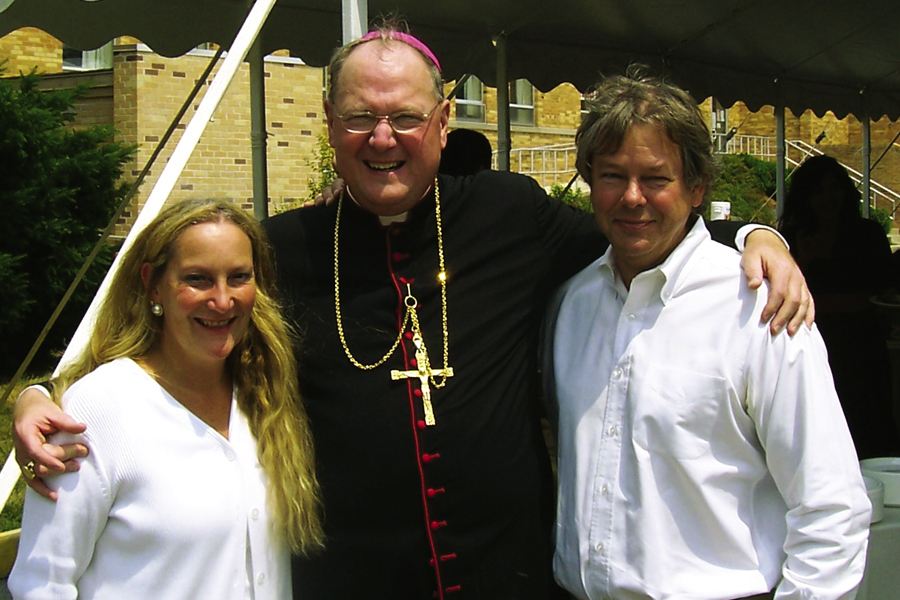Kathy Suhr has gotten her hopes up 14 times only to be disappointed.
Suhr, the owner of the Marian Center and a parishioner of St. Mary’s Visitation Parish in Elm Grove and is one of more than 100,000 people in the U.S. who need a kidney transplant. Fourteen potential donors have been disqualified thus far.
“I’m waiting to feel good,” she said, hoping for a match. “I don’t know what it feels like to feel good.”

Kathy Suhr (left) and her husband, Bill (right), pose with Cardinal Dolan. Kathy, the owner of the Marian Center, is need of a kidney transplant and is looking for a donor. (Photos courtesy of Bill Suhr)
In 2015, Suhr went to the emergency room to get a dog bite checked, but medical personnel noticed her blood pressure was high, and she had an irregular, rapid heart rate, both of which are genetically inherited and were affecting her kidney function. Doctors put her on two medications that offset other nutrients in her body, like the amount of sodium or potassium, and her kidney function further declined, said Bill Suhr, Kathy’s husband.
In December, doctors had to put a tube in Kathy’s lung to drain fluid, as well as cut into her back to clean out mucus.
“That was the end of her kidneys,” Bill said.
Since then, Kathy has received dialysis, a process that cleans her blood like a healthy kidney would, for four hours a day, three days a week.
“It drains her physically,” said Bill. “A lot of days (she does) nothing but sleep. It’s emotionally draining, too, because you know you’re being kept alive by a machine.”
Kathy is on the kidney transplant waiting list at Froedtert Hospital, but the average wait time for a transplant is about four years. The life expectancy for someone on dialysis is about five years, according to the National Kidney Foundation.
Further statistics aren’t any more promising. The National Kidney Foundation said 243 people die every day from kidney failure. Last year, $31 billion in Medicare funds were used to treat kidney failure, while only $547 million dollars were spent on research of kidney disease, a disease that effects one in seven Americans, according to the American Journal of Kidney Diseases.
This spring, Bill, who cannot give Kathy one of his kidneys because of familial cystic kidney disease, decided to become proactive after three of Kathy’s relatives were disqualified from giving her a kidney. He spread the word about Kathy’s need to family and friends, put a plea out on Facebook and even emailed a plea out to the Marian Center email list.
“Nothing about this is prideful,” he said. “I’ll do whatever it takes.”
Finding a donor is a painful process, but a process the Suhrs have to endure to keep Kathy alive. Froedtert only qualifies one person at a time as a potential match. But, a potential match isn’t always the perfect match.
In order to become a kidney donor, one has to submit only two confidential forms detailing his or her medical history. Within hours or a few days, the transplant center will schedule a telephone interview with the potential donor to review his or her medical history. The donor will then go through 12 hours of testing and interviews. If the results are good, there will be a blood test for a tissue match.
If the tissue matches, the transplant is a go. A donor’s procedure includes several small incisions, with the whole procedure lasting two to three hours. Hospital recovery time is one to three days, and most donors can return to normal activities within two to three weeks, according to the University of San Francisco’s Transplant Center. Donors live a normal life expectancy, don’t have to take any long-term medication and donating comes at no cost.
While Kathy could receive a cadaver kidney, a live organ donor is ideal. A cadaver-donated kidney lasts on average about 15 years whereas a live donor kidney lasts about 29 years, according to the data published in the American Journal of Transplantation.
Although the numbers have not been in her favor thus far, Kathy is hopeful she will receive a kidney.
“We still have God’s work to do; otherwise we wouldn’t be here,” she said.
Kathy has done God’s work at the Marian Center, which sells Catholic books, gifts and supplies. When she heard the Marian Center was for sale several years ago, she felt she needed to save it, so she and Bill stepped up as new owners. She and Bill have also set up Marian Charities in connection to the store, which supports Pro-Life Wisconsin, the Covenant House in New York City, which provides services to the homeless, runaway or throwaway children, and the Star of the Sea, which helps young female victims of human trafficking.
In addition, Kathy provides support and friendship to the School Sisters of Notre Dame as a Lay Associate and had served the members of St. Mary’s Visitation Parish before her health declined.
Kathy said she tries to stay positive because her fate is in God’s hands.
“You have to keep your faith because it’s important,” she said. “If you don’t have faith, I don’t know how you get through this.”
If you are interested in donating, or would like to learn more, please contact Bill at bsuhr67@gmail.com or call 262-827-9280.
